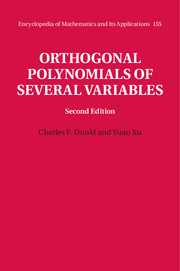Book contents
- Frontmatter
- Contents
- Preface to the Second Edition
- Preface to the First Edition
- 1 Background
- 2 Orthogonal Polynomials in Two Variables
- 3 General Properties of Orthogonal Polynomials in Several Variables
- 4 Orthogonal Polynomials on the Unit Sphere
- 5 Examples of Orthogonal Polynomials in Several Variables
- 6 Root Systems and Coxeter Groups
- 7 Spherical Harmonics Associated with Reflection Groups
- 8 Generalized Classical Orthogonal Polynomials
- 9 Summability of Orthogonal Expansions
- 10 Orthogonal Polynomials Associated with Symmetric Groups
- 11 Orthogonal Polynomials Associated with Octahedral Groups, and Applications
- References
- Author Index
- Symbol Index
- Subject Index
10 - Orthogonal Polynomials Associated with Symmetric Groups
Published online by Cambridge University Press: 05 August 2014
- Frontmatter
- Contents
- Preface to the Second Edition
- Preface to the First Edition
- 1 Background
- 2 Orthogonal Polynomials in Two Variables
- 3 General Properties of Orthogonal Polynomials in Several Variables
- 4 Orthogonal Polynomials on the Unit Sphere
- 5 Examples of Orthogonal Polynomials in Several Variables
- 6 Root Systems and Coxeter Groups
- 7 Spherical Harmonics Associated with Reflection Groups
- 8 Generalized Classical Orthogonal Polynomials
- 9 Summability of Orthogonal Expansions
- 10 Orthogonal Polynomials Associated with Symmetric Groups
- 11 Orthogonal Polynomials Associated with Octahedral Groups, and Applications
- References
- Author Index
- Symbol Index
- Subject Index
Summary
In this chapter we consider analysis associated with symmetric groups. The differential–difference operators for these groups, called type A in Weyl group nomenclature, are crucial in this theory. The techniques tend to be algebraic, relying on methods from combinatorics and linear algebra. Nevertheless the chapter culminates in explicit evaluations of norm formulae and integrals of the Macdonald–Mehta–Selberg type. These integrals involve the weight function Π1≤i<j≤d|xi − xj|2κ on the torus and the weight function on ℝd equipped with the Gaussian measure. The fundamental objects are a commuting set of self-adjoint operators and the associated eigenfunction decomposition. The simultaneous eigenfunctions are certain homogeneous polynomials, called nonsymmetric Jack polynomials. The Jack polynomials are a family of parameterized symmetric polynomials, which have been studied mostly in combinatorial settings.
The fact that the symmetric group is generated by transpositions of adjacent entries will frequently be used in proofs; for example, it suffices to prove invariance under adjacent transpositions to show group invariance. Two bases of polynomials will be used, not only the usual monomial basis but also the p-basis; these are polynomials, defined by a generating function, which have convenient transformation formulae for the differential–difference operators. Also, they provide expressions for the nonsymmetric Jack polynomials which are independent of the number of trailing zeros of the label α ∈ ℕd0.
- Type
- Chapter
- Information
- Orthogonal Polynomials of Several Variables , pp. 318 - 363Publisher: Cambridge University PressPrint publication year: 2014



